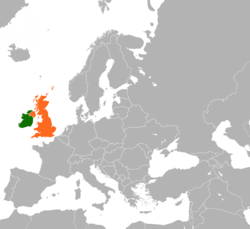Ireland–United Kingdom relations
This article has multiple issues. Please help improve it or discuss these issues on the talk page. (Learn how and when to remove these template messages)
No issues specified. Please specify issues, or remove this template. |
This article may need to be rewritten to comply with Wikipedia's quality standards. (February 2009) |
 | |
Ireland |
United Kingdom |
|---|---|
British–Irish relations (traditionally and still more commonly referred to as Anglo-Irish relations) is a term used to describe the diplomatic and governmental relationships between the United Kingdom of Great Britain and Northern Ireland and the two Irish states that have existed since 1922, namely the Irish Free State (1922–1937) and Ireland (1937–present).
The usage of the term has been reflected in some legal treaties signed by both states, namely the
- Anglo-Irish Treaty (1922)
- Anglo-Irish Agreement (1985).
Meetings of the British Prime Minister and the Irish Taoiseach are generally referred to as Anglo-Irish Summits.
History
Early history
Due to close proximity to each other there have been relations between British and Irish peoples for millennia. The Romans (who occupied Britain) for instance maintained a trading post near the location of modern Dublin. During the Dark Ages Ireland was critical to the re-Christianisation of Britain.
With the Hiberno-Norman invasions of Ireland the two islands' destinies became ever more entwined and for the majority of the second millennium AD Ireland's relation with England varied between large areas of the island being under direct control to a dangerous threat under strong continental influence. For much of the millennium however English rule was kept to The Dublin Pale with the rest of the island being ruled over by various local rulers and descendants of the original Norman invaders. England's Kings were awarded the Lordship of Ireland by the Papacy in 1171, but the degree of influence and control the English crown exercised in Ireland fluctuated over the centuries. In 1542, The Irish Parliament acceeded to the demand of Henry VIII of England to be declared 'King of Ireland', a title held by his successors on the English, and later the Great British thrones, but with Ireland remaining a separate Kingdom linked to England (and later Scotland) only by a personal union.
United Kingdom
With the Act of Union of 1800, Ireland joined the United Kingdom as its third constituent kingdom. Irish Independence was a fairly major political issue in Britain over the late 19th and early 20th century, culminating in the passage of the third home rule act in 1914. However, World War I delayed its implementation; this situation led extremist elements in Ireland to take a more violent route to independence, one that resulted in the Irish War of Independence and the establishment of the Irish Free State in 1921.
Independent Ireland
Relations at first were shaky with events such as the Anglo-Irish Trade War, Irish neutrality during World War II and Ireland's sudden unilateral declaration of a republic and withdrawal from the British Commonwealth in 1949.
Modern era
For a long time, many Irish people had sought some sort of recognition from the British government for the immense loss of life in Ireland during the Famine caused by the policy of the then British government, i.e. increasing Irish food exports to Britain while the population starved to death. When Tony Blair became the British prime minister, he apologised to the Irish people, in an effort to progress the British–Irish relationship to the next stage. The next stage would eventually lead to the Good Friday Agreement, bringing hopes of a lasting peace in Northern Ireland and the amelioration of British–Irish relations, with the setting up of the British–Irish Council and North–South Ministerial Council.
An estimated 24% or 14 million Britons claim Irish descent.[1] In 2008 it was reported that the French government were considering proposing that Ireland and the UK share an EU Commissoner because of the "similar culture and language" between the two states.[2] However, given that one of the principal reasons that Ireland rejected the Lisbon treaty in 2008 was the fact that it would lose its EU commissoner, this is extremely unlikely to be adopted.

